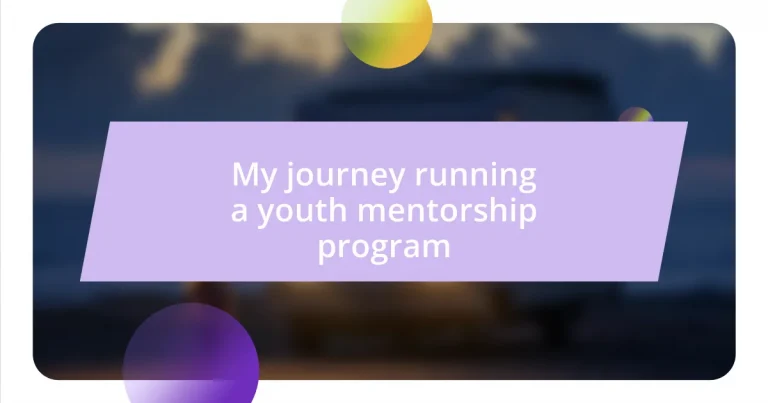Key takeaways:
- Youth mentorship creates transformative relationships that provide emotional support, develop essential life skills, and foster community impact through a cycle of empowerment.
- Structuring a mentorship program requires clear goals, mentor training, thoughtful matching, regular check-ins, and a feedback mechanism to ensure enriching experiences for both mentors and mentees.
- Sustaining long-term impact relies on continuous dialogue, community engagement, and empowering mentees to take leadership roles, reinforcing their commitment and growth within the program.
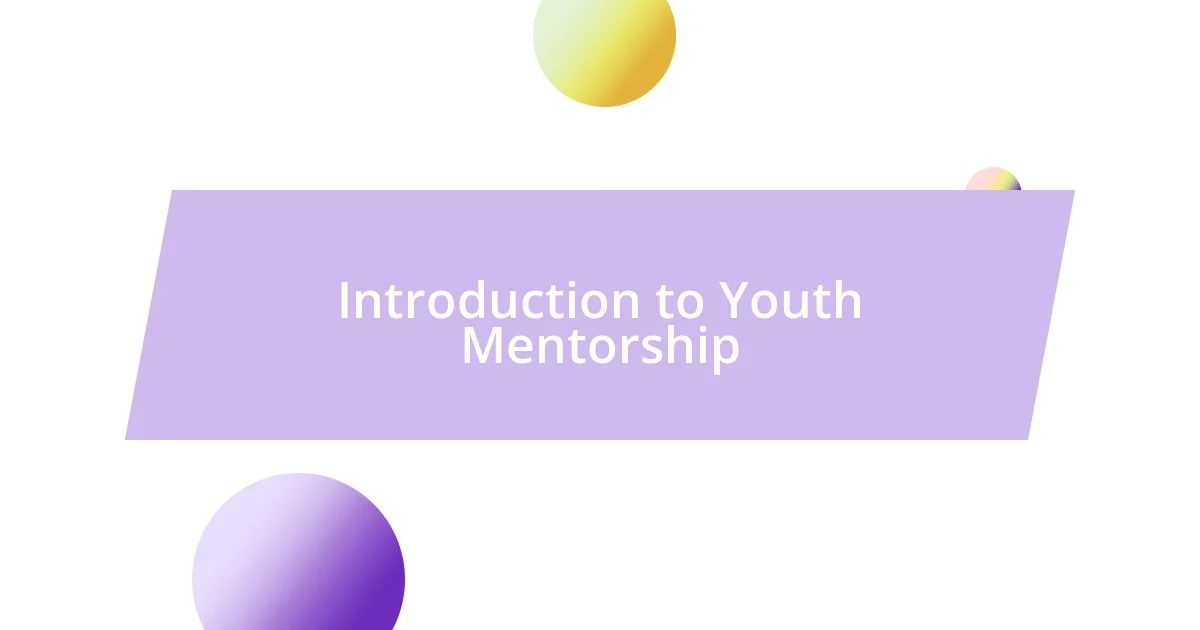
Introduction to Youth Mentorship
When I first stumbled upon the concept of youth mentorship, I was immediately struck by its potential to transform lives—not just for the mentees but also for the mentors. It’s profound to think about how one person’s guidance can ignite hope and inspiration in young individuals, often at a crucial turning point in their lives. Have you ever wondered how a small act of kindness can create ripples in a community?
In my own experience, stepping into a mentoring role was both humbling and rewarding. I remember my first mentee, a bright kid with dreams yet clouded by insecurities. Each interaction opened my eyes to the unique challenges young people face today, such as social pressure and self-doubt. Seeing their strength emerge was unlike anything I had ever witnessed before.
Youth mentorship isn’t just about providing advice; it’s about creating a safe space where young minds can express themselves freely. The emotional bond that develops throughout this journey can be life-changing. Reflecting on my experiences, I often ask myself: what would I have become without the guiding lights in my life? That realization fuels my passion for mentoring others today.
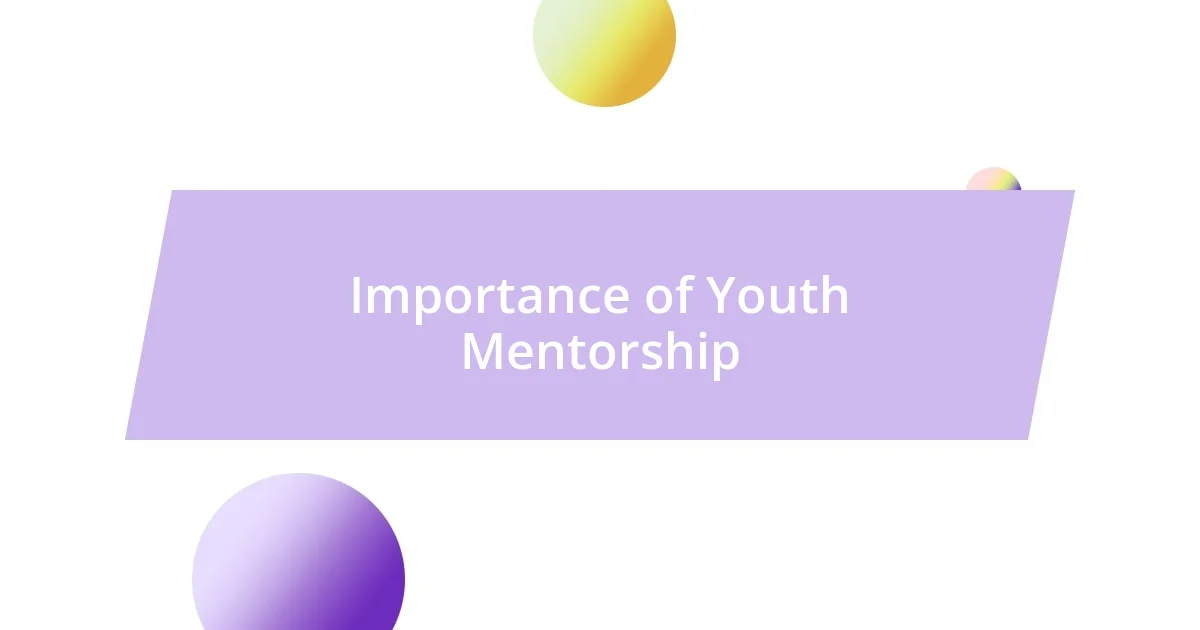
Importance of Youth Mentorship
The importance of youth mentorship cannot be overstated. From my perspective, mentoring provides young people with not just guidance, but also a sense of belonging. I remember one of my mentees struggled with feelings of isolation and self-doubt. I often find it incredible how meaningful conversations can help them feel seen and validated. That connection can truly empower them to embrace their potential.
Another key benefit of youth mentorship lies in the development of essential life skills. I have seen mentees grow in confidence, communication, and critical thinking during our time together. For instance, one mentee of mine learned to articulate her thoughts through our discussions, which not only boosted her self-esteem but also improved her performance in school. This transformation goes beyond mere academics; it shapes their future interactions and relationships.
Lastly, youth mentorship has significant ripple effects on the community. When young individuals are supported in their journeys, they often pay it forward. In my experience, mentees who thrive tend to mentor others as they grow older. This creates a cycle of empowerment, ultimately benefiting society at large. Every success story is a testament to how impactful mentorship can be, and I cherish being part of that chain.
| Benefits | Examples from Experience |
|---|---|
| Emotional Support | Aiding mentees through feelings of isolation and insecurity |
| Skill Development | Mentees improving communication and critical thinking |
| Community Impact | Mentees becoming mentors and supporting others |
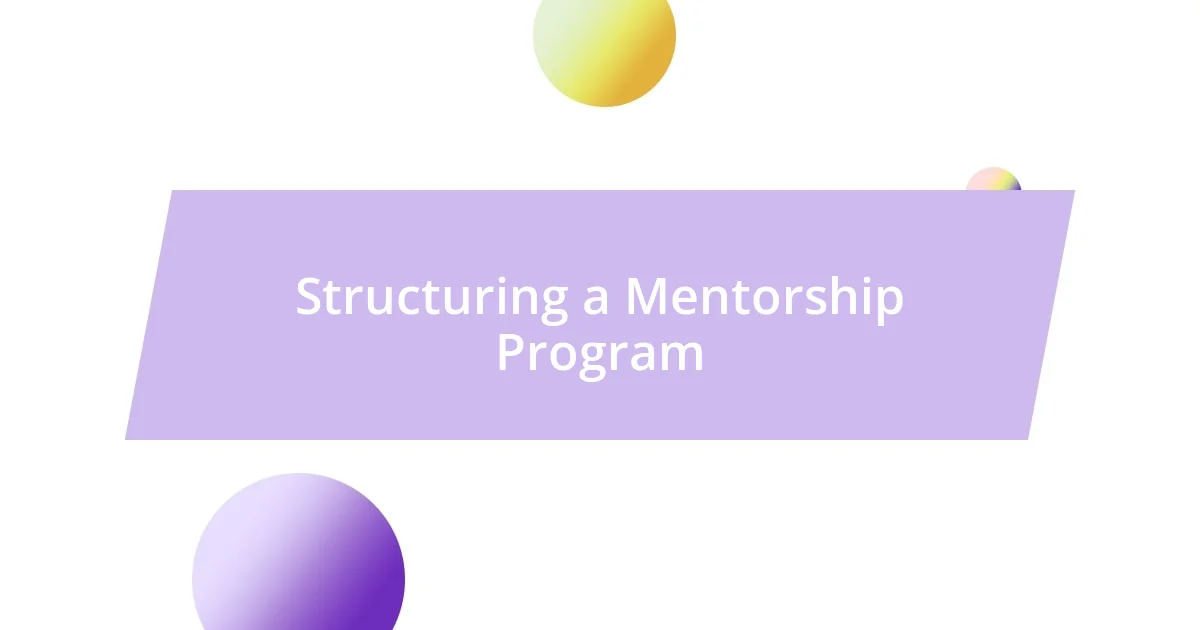
Structuring a Mentorship Program
Structuring a mentorship program requires careful thought and planning. In my experience, it’s crucial to define the goals and expectations upfront. This clarity not only helps mentors and mentees understand their roles but also sets the tone for constructive relationships. I remember when I first started; outlining objectives helped alleviate the anxiety of what could feel like a daunting task. It took the pressure off, allowing the focus to shift toward growth and connection.
To create a solid framework, consider incorporating the following elements:
- Goals and Objectives: Clearly define what you want the program to achieve.
- Mentor Training: Provide resources and support to prepare mentors for their roles.
- Matching Process: Develop a thoughtful system for pairing mentors with mentees based on interests and needs.
- Regular Check-ins: Schedule frequent meetings to discuss progress and address challenges.
- Feedback Mechanism: Ensure that both mentors and mentees can share their thoughts on the mentoring experience.
When I implemented regular check-ins in my program, I was amazed by how it fostered deeper connections. The mentees often opened up during these discussions, sharing their growth and hurdles. Those conversations transformed our relationships, making the mentorship experience not just beneficial but profoundly enriching.

Recruiting and Training Mentors
Finding the right mentors is crucial for the success of any youth mentorship program. I remember when I set out to recruit mentors for my program, I aimed to attract diverse individuals who brought unique experiences and perspectives to the table. It was a learning curve, realizing just how powerful a mentor’s own life story can be in resonating with a young person. Have you ever thought about how your background shapes your mentoring style? That’s something I often reflect on, especially after seeing how mentees connect with mentors who have walked similar paths.
Once I assembled a group of potential mentors, training became the next focal point. I discovered that equipping them with practical skills is just as important as fostering empathy. For instance, in one of our training sessions, we practiced active listening techniques. Watching mentors ease into that process, feeling more comfortable with vulnerability, was truly rewarding. It’s fascinating how the ability to listen can completely shift the dynamic of a conversation. Have you ever noticed how much more you can learn when someone really hears you?
To ensure that training remains effective, ongoing support is essential. I introduced monthly workshops that focused not only on mentorship skills but also on self-care and emotional resilience. The conversations that emerged during these sessions were profound. It was eye-opening to see mentors share their struggles and victories, fostering a sense of community and collaboration. I’ve often asked myself—what would it look like if every mentor felt supported in their journey? From my perspective, that culture of support not only enhances their mentorship capabilities but enriches their own lives as well.

Engaging Youth Participants
Engaging youth participants in a mentorship program isn’t just about structure; it’s about creating an environment where they feel valued and heard. I recall a time when we organized brainstorming sessions that allowed mentees to voice their interests and concerns. It was enlightening to see how their ideas transformed the program. Isn’t it fascinating how a little empowerment can ignite a young person’s enthusiasm?
Another effective strategy I’ve employed is interactive workshops. These sessions not only deliver vital content but also encourage collaboration among participants. I can personally attest to the power of role-playing activities. During one workshop, I watched as the youth expressed their feelings through skits, breaking down barriers and building camaraderie. I often wonder—what if we could harness that energy beyond the confines of the program?
It’s crucial to continuously celebrate the achievements of the mentees. I initiated a monthly recognition event where participants could share their progress with the group. The pride on their faces when they received acknowledgment was unmistakable. Have you ever noticed how recognition can propel someone’s confidence? From my perspective, those moments not only reinforce their growth but also weave a stronger community fabric.
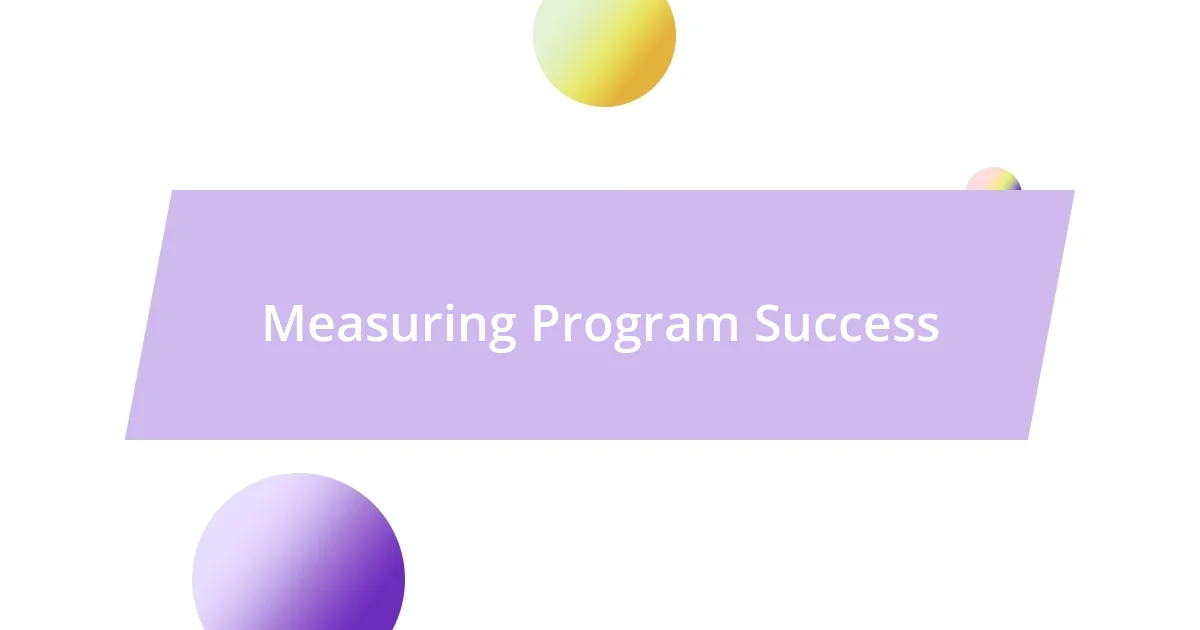
Measuring Program Success
Measuring the success of a youth mentorship program goes beyond just tracking participation numbers; it’s about understanding the impact on both mentors and mentees. I implemented feedback mechanisms, like anonymous surveys after each session, to gauge the emotional and educational shifts occurring. It’s interesting how simple questions can reveal deeper insights. For instance, one mentee shared that they felt more confident speaking up in class after just a few weeks of mentorship. That kind of feedback is invaluable, don’t you think?
To quantify our impact, I started to track long-term outcomes, such as academic improvements and relationship-building among participants. When I noticed a mentee improve their grades and, equally important, develop friendships outside their regular circles, it drove home just how interconnected these benefits can be. Have you ever connected the dots between personal growth and community engagement? That realization opened my eyes to the broader role mentorship plays.
Furthermore, I began using storytelling as a way to measure success. I encouraged both mentors and mentees to share their journeys through written or spoken stories. Reflecting on progress in narrative form often ignites a sense of ownership and accountability. One mentor told me their story during our annual gala, emphasizing how much they had grown alongside their mentee. Isn’t it powerful to witness the growth through shared narratives? That’s where I truly felt the heartbeat of the program—the transformation was real, and it resonated deeply with everyone present.

Sustaining Long-Term Impact
Sustaining long-term impact in a youth mentorship program requires more than just initial enthusiasm; it demands an ongoing commitment to growth and adaptation. I remember a mentor who shared a powerful insight during a discussion: “The real magic happens when we keep the conversations going.” This struck me, highlighting how continuous dialogue—and not just feedback sessions—fuels lasting change. Have you ever thought about the difference between a momentary conversation and an ongoing relationship? It’s in those sustained connections that true transformation occurs.
Another key element is creating a network of support. I found that when mentors stay engaged beyond formal sessions, it fosters a richer experience for the youth. One evening, a mentor organized a casual get-together at a local park, where everyone could relax and connect outside the structured program. The smiles and laughter echoed the bonds formed through the shared experiences—how can we underestimate the power of community in reinforcing growth?
Furthermore, I’ve learned that sustainability relies on building leadership within the group. I encouraged mentees to step into leadership roles in planning and facilitating activities. One young person, shy at first, took on the task of leading a discussion about future program goals. Watching their growth as they navigated that responsibility illuminated a vital truth: when youth feel a sense of ownership, they are more likely to stay engaged. Have you witnessed the remarkable impact of empowering others? It’s a beautiful cycle that enhances both individual and collective development.












